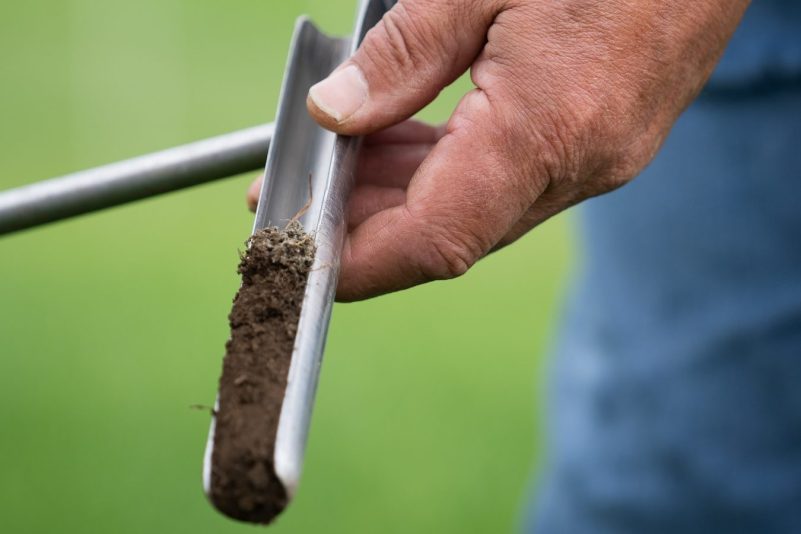Approaches to Soil Monitoring across the Four Nations

As part of the Soil Health and Carbon Dynamics Topic Advisory Group (TAG), The Sustainable Soils Alliance in collaboration with the UK Centre for Hydrology and Ecology hosted a workshop in February 2024 to identify, map and evaluate readiness of soil-assessment-focussed research for policy delivery taking place across the UK. The objectives were to build greater understanding of the detail behind current and planned soil monitoring activities by UK government departments, and lay the groundwork for a roadmap towards harmonisation of frameworks, methods and protocols.
Summary
The workshop was attended by two groups of stakeholders: policymakers in the soil and land use departments of each of the four devolved administrations (England, Wales, Scotland and Northern Ireland) who have developed (or are developing) soil monitoring programmes, and the suppliers of these programmes who worked on (or are working on) the technical detail.
In terms of national monitoring schemes, discussion revolved around the analysis of the spreadsheet, that compared 15 national soil monitoring schemes, some ongoing with others currently being considered as part of the next phase of national monitoring. This included background context such as the driving policy objective, and extensive detail on the technical methodology of each scheme. A number of technical points stood out in comparing the schemes, and discussion followed on the relative merits of different practices. The diverse risks faced by each devolved administration was noted as a particularly important factor in approaching monitoring.
There followed a brief presentation on the spread of various on-farm soil monitoring schemes, both through national incentivisation programmes and private companies. The potential value of data emerging from these schemes was highlighted, and discussion focussed on the relative role of carbon sequestration for all stakeholders. The group also reflected on the European context of soil monitoring and the important point was raised that the EU Join Research Centre and EU soil observatory has sampled and has historic data on UK soils, but is unlikely to continue this going forward. It was agreed among the group that it would be highly beneficial to remain part of EU-level research for a number of reasons.
Attendees were given the opportunity to distil pressing research questions into asks for the LUNZ soil TAG, as a means to address the points raised above. This was a unique opportunity for policymakers to highlight critical areas of interest where collaboration might be beneficial. Options for future work included covering the following key topics:
Development of minimum set of metrics for soil health assessment
- The information provided on government monitoring schemes demonstrated the extensive variety of measurement categories and methods to assess soil health. For the data produced from these schemes to be meaningfully comparable there needs to be a certain degree of alignment.
- This alignment could help contextualise risks and highlight opportunities where novel approaches to soil management are producing replicable results.
- Approaching this could entail a refresh of the soil quality index SQUID (Soil QUality InDicator) that links a set of ten different soil functions to different ecosystem services, and/or a meeting of a smaller group of soil-leads from each of the four UK governments.
Fostering a common approach to land manager-led / industry-supported soil monitoring
- The profusion of independent monitoring schemes/toolkits are already producing data at scale, and there is little understanding of how any of it aligns.
- To limit confusion in the community, an analysis of these schemes would be a valuable first step to understand what is out there already, what metrics they require, and what learnings there are from land managers.
- This could lead to the development of a flowchart that indicates to land managers (and researchers and policymakers) which options there are for different purposes.
- Appetite for changing methodologies is unlikely to be strong among toolkit providers, but bringing together the interested parties could help to identify key areas where harmonisation is possible. This could take the form of research interviews leading to a stakeholder workshop.
Establishing minimum common requirements for national land management incentivisation schemes
- All devolved administrations are in the process of developing sustainable farming incentivisation schemes. England and Northern Ireland have already released their approach or start to their approach. In England this rewards farmers for collecting data on soil health. In Northern Ireland, the government pays for the sampling of all agricultural fields and provides that data back to the farmer.
- There is great potential value in working to ensure the data collected has a degree of consistency, to support wider targets and understanding of soil heath. This could include: how to collect the sample; to what depth; frequency; minimum set of standardised measurements etc.
- A workshop that engages policymakers involved in developing these schemes could harness this unique window of opportunity to create a level of harmonisation across the UK.
Comparison of approaches to eDNA methods
- The growth in different biological methods for soil health assessment was raised as an opportunity to share understanding across nations and monitoring providers.
- This could take the form of a subgroup of the attendees, and would contribute towards a standardised library of biological methods. UKEOF have offered to host such a group to complement their working group on eDNA in waters.
Briefing on emerging net-zero agricultural technologies
- A number of approaches to net-zero farming were discussed (biochar, enhanced rock weathering etc.), with concern shared in the group that the evidence base behind them is not necessarily sufficiently robust enough to justify their use or support in sustainable farming incentivisation schemes.
- These questions are highly relevant to the wider LUNZ Hub, and a research project or workshop could be proposed that includes the Land Use and Agricultural Systems working groups to better assess their application.

Ellen Fay
Soil Health and Carbon Dynamics

Professor Bridget Emmett
Wales
Read the Full Report Here
Explore a Visualisation of National Soil Monitoring Schemes
Explore the Analysis of 4-Nation Soil Monitoring Spreadsheet
Subscribe to our Newsletter
A quarterly update of all LUNZ Hub activities, events and news stories.
